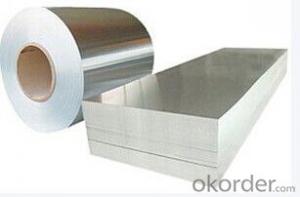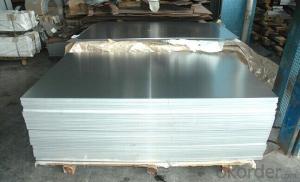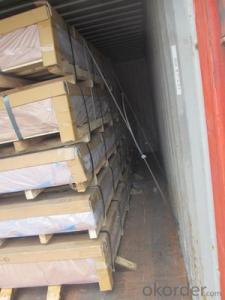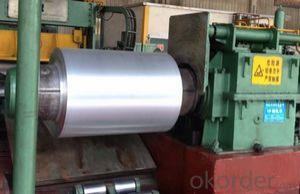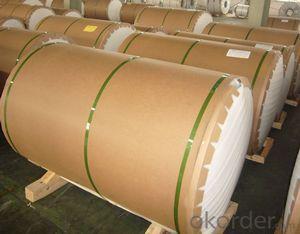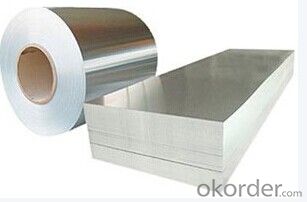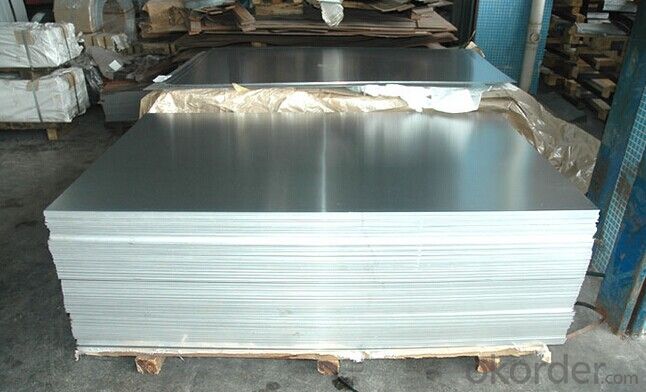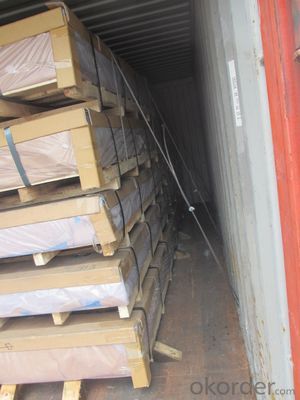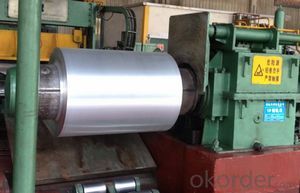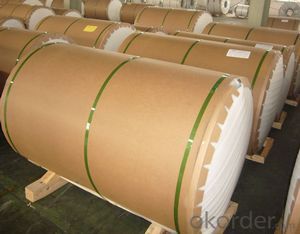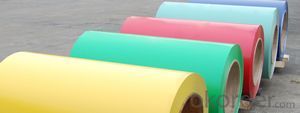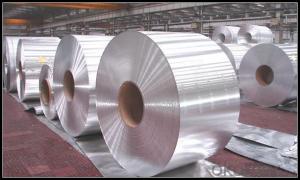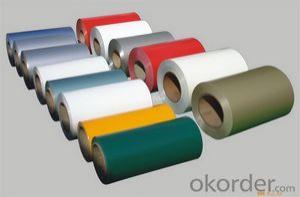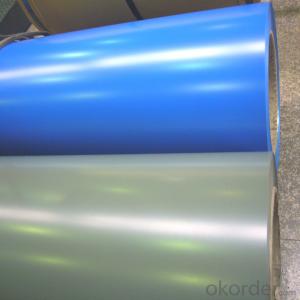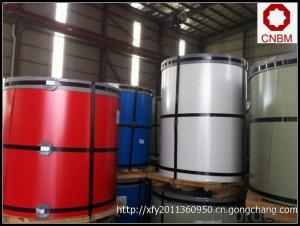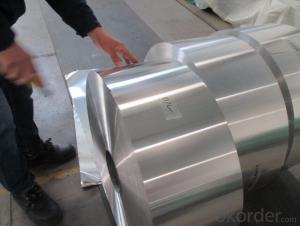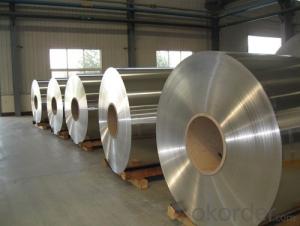AA 3105 Aluminium Sheet - Aluminum Tape Coil
- Loading Port:
- China Main Port
- Payment Terms:
- TT OR LC
- Min Order Qty:
- -
- Supply Capability:
- -
OKorder Service Pledge
Quality Product, Order Online Tracking, Timely Delivery
OKorder Financial Service
Credit Rating, Credit Services, Credit Purchasing
You Might Also Like
supply Mill-finished / coated aluminum plate/sheet/ coil:
Alloy: AA1050,1060,1100,1200,2024,3003,3304,3005,3015,5052,5086,5754,5083,6061,7050,7475,8011, etc
Temper: O, H14/16/18/22/24/32/ H112/H321/T6,T851,T7451,T7351, etc
Thickness: 0.02mm—20mm
Width: 100mm—2000mm (Can be slitted)
Notice: PE coating / PVDF coating / Embossment can be done if required.
- Q: Are aluminum coils resistant to fire?
- Yes, aluminum coils are generally resistant to fire due to their high melting point and low flammability.
- Q: Are there any health or safety concerns related to aluminum coils?
- There are no significant health or safety concerns directly associated with aluminum coils. Aluminum is a common material used in various industries, including HVAC systems. It is lightweight, durable, and corrosion-resistant. However, it's important to ensure proper ventilation and avoid exposure to high concentrations of airborne aluminum dust or fumes, as excessive inhalation or ingestion might pose some health risks. Nonetheless, in typical applications, aluminum coils do not pose any significant health or safety concerns.
- Q: a) Although Aluminium is a reactive metal, it is used to make door frames and window frames.b) Although Aluminium conducts heat, it is used to make blankets, which are good thermal insulators.
- a] AL is used to make frames because it is light, not costly and strong.
- Q: Are aluminum coils suitable for corrosion-resistant applications?
- Yes, aluminum coils are suitable for corrosion-resistant applications. Aluminum has natural corrosion-resistant properties as it forms a protective oxide layer when exposed to air, which prevents further corrosion. Additionally, aluminum can be further enhanced with various coatings or treatments to increase its resistance to corrosion, making it a suitable choice for applications where corrosion resistance is required.
- Q: How are aluminum coils protected against oxidation?
- Aluminum coils are protected against oxidation through a process called aluminum coil coating. This involves applying a protective coating or layer onto the surface of the coil to prevent direct contact with oxygen and other environmental elements that may cause oxidation. The protective coating acts as a barrier, shielding the aluminum from moisture, air, and other corrosive substances. There are different types of coatings used for aluminum coil protection. One common method is the application of a clear or colored organic coating, such as polyester or polyvinylidene fluoride (PVDF). These coatings not only provide a barrier against oxidation but also enhance the durability and aesthetic appeal of the coils. Another method is anodizing, which involves immersing the aluminum coil in an electrolytic solution and passing an electric current through it. This process forms a layer of aluminum oxide on the surface of the coil, which acts as a natural protective barrier against oxidation. Anodized aluminum coils are known for their excellent corrosion resistance and can be further enhanced with additional coating layers. Additionally, aluminum coils can be protected through the use of chemical conversion coatings. These coatings, such as chromate or phosphoric acid-based coatings, chemically react with the aluminum surface, forming a protective layer that prevents oxidation. Overall, the protection of aluminum coils against oxidation is crucial to ensure their longevity and performance. By applying various coatings or undergoing anodizing or chemical conversion processes, the coils can effectively resist oxidation and maintain their integrity even in harsh environments.
- Q: metals an aluminum can is made of, cast aluminum, 6160 aluminum, sheet aluminum
- the aluminum is alloyed with various metals to change the characteristics of the aluminum the link below shows a table showing the various chemical/metals added to aluminum to make different alloys
- Q: Can aluminum coils be used in automotive applications?
- Yes, aluminum coils can be used in automotive applications. Aluminum coils are lightweight, which makes them an excellent choice for automotive manufacturers as it helps to reduce the overall weight of the vehicle. This, in turn, can improve fuel efficiency and performance. Additionally, aluminum coils have excellent heat conductivity, which is crucial in automotive applications where heat dissipation is important. Moreover, aluminum coils have good corrosion resistance, which is particularly beneficial in automotive applications where vehicles are exposed to various weather conditions and road salts. Overall, the use of aluminum coils in automotive applications can provide several advantages such as weight reduction, improved fuel efficiency, better heat dissipation, and enhanced corrosion resistance.
- Q: Are aluminum coils resistant to corrosion?
- Yes, aluminum coils are highly resistant to corrosion due to the natural oxide layer that forms on their surface, protecting them from environmental factors.
- Q: This question asks for a comparison between aluminum coils and other metal coils, highlighting their distinct characteristics.
- <p>Aluminum coil is distinct from other metal coils due to its lightweight, high corrosion resistance, and excellent thermal and electrical conductivity. Compared to steel coils, aluminum coils are softer and more ductile, making them easier to bend and shape without breaking. They are also non-magnetic and have a lower melting point. Copper coils, on the other hand, have superior electrical conductivity but are heavier and more expensive. Zinc coils offer good corrosion resistance but are less ductile and have lower strength. Each metal coil has specific properties that make them suitable for different applications, such as construction, electrical wiring, or automotive parts.</p>
- Q: I am confused by that. One guy told me that he puts aluminium foil on his modem to receive the Internet better. Another guy told me that aluminium stops all kind of rays. What is correct?
- You can use aluminum foil to build a reflector to make a Wi-Fi router directional, and increase its range. You can also use it for electromagnetic shielding. Design matters.
Send your message to us
AA 3105 Aluminium Sheet - Aluminum Tape Coil
- Loading Port:
- China Main Port
- Payment Terms:
- TT OR LC
- Min Order Qty:
- -
- Supply Capability:
- -
OKorder Service Pledge
Quality Product, Order Online Tracking, Timely Delivery
OKorder Financial Service
Credit Rating, Credit Services, Credit Purchasing
Similar products
Hot products
Hot Searches
Related keywords
